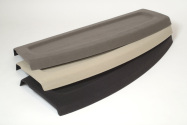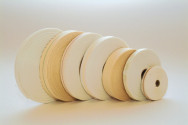STAP a.s.
Adresse
STAP a.s.
C.P. 103
40780 Vilemov u Sluknova
Czech Republic
Telefon+420 412 315 521
Fax+420 412 315 506
Entdecken Sie mehr von uns
Folgen Sie uns auf
Über uns
Narrow Fabrics Manufacturer - production of webbings, straps, elastics, zippers, woven labels and badges and non-woven textiles
Production for automotive industry, military, electrotechnical industry, clothes, shoes and other segments.
Unsere Produktgruppen
- Woven Fabrics, Laid Webs, Braidings, Knitted Fabrics
- Nonwovens
Unsere Anwendungsbereiche / Lösungen
Keywords
- strap
- webbing
- tape
- polyester
- polypropylene
Unsere Produkte

Zippers, chain
Our coil zippers and zipper tapes come in three standard widths S40, S60, S80 and one nonstandard width S50. Zippers are mainly composed out of virgin polyester, but in our product range is also zipper made of recycled polyester

Non Woven Textile
Needled unwoven fabrics in a mixture of artificial, natural and glass fibres in the STAP premises since 2006. The fabrics can be delivered in rolls or in form of blanks. At present, the main raw material processed consists of a mixture of polypropylene and glass fibres delivered to automotive industry for the production of interiors of luggage compartments and storage panels above the luggage compartment.

Webbings and straps
Wide range of widths and thicknesses, using various materials and many combinations of these materials– cotton, linen, jute, polyamide, polypropylene, polyester, aramid yarns (TechnoraŸ, TwaronŸ), high-pressure polyethylene (DyneemaŸ)andspecial fibres with a low value of IR reflection.

Woven insulation tapes
Insulation tapes come in plain and twill weaves, with one or both selvedges (hems) able to be reinforced.They are produced in widths from10 – 60 mm and thicknesses from 0.08 to 0.50 mm. In addition to their thickness, the most important factor is the class of thermal resistance determined by the material used. Insulation tapes are made of polyester (Class F thermal resistance) and glass fibres (Class H thermal resistance). Cotton is used less often. New applications with special yarns and aramid fibres have recently been employed.




